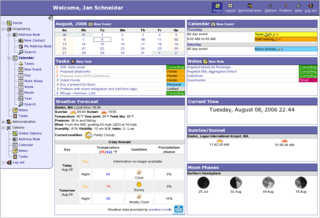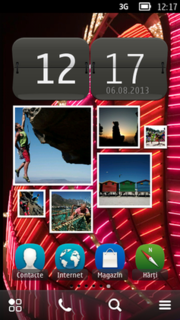
Oracle is an American multinational computer technology corporation headquartered in Austin, Texas. The company was formerly headquartered in Redwood Shores, California until December 2020 when it moved its headquarters to Texas. The company sells database software and technology, cloud engineered systems, and enterprise software products—particularly its own brands of database management systems. In 2020, Oracle was the second-largest software company in the world by revenue and market capitalization. The company also develops and builds tools for database development and systems of middle-tier software, Enterprise Resource Planning (ERP) software, Human Capital Management (HCM) software, Customer Relationship Management (CRM) software, Enterprise Performance Management (EPM) software, and Supply Chain Management (SCM) software.

Palm OS is a discontinued mobile operating system initially developed by Palm, Inc., for personal digital assistants (PDAs) in 1996. Palm OS was designed for ease of use with a touchscreen-based graphical user interface. It is provided with a suite of basic applications for personal information management. Later versions of the OS have been extended to support smartphones. Several other licensees have manufactured devices powered by Palm OS.

Oracle Solaris is a proprietary Unix operating system originally developed by Sun Microsystems. It superseded the company's earlier SunOS in 1993. In 2010, after the Sun acquisition by Oracle, it was renamed Oracle Solaris.

SourceForge is a web service that offers software consumers a centralized online location to control and manage open-source software projects and research business software. It provides source code repository hosting, bug tracking, mirroring of downloads for load balancing, a wiki for documentation, developer and user mailing lists, user-support forums, user-written reviews and ratings, a news bulletin, micro-blog for publishing project updates, and other features.
J.D. Edwards World Solution Company or JD Edwards, abbreviated JDE, was an Enterprise resource planning (ERP) software company. Products included World for IBM AS/400 minicomputers, OneWorld for CNC architecture, and JD Edwards EnterpriseOne. The company was founded March 1977 in Denver, Colorado, by Jack Thompson, C.T.P. "Chuck" Hintze, Dan Gregory, and C. Edward "Ed" McVaney.

A web application is application software that runs on a web server, unlike computer-based software programs that are run locally on the operating system (OS) of the device. Web applications are accessed by the user through a web browser with an active network connection. These applications are programmed using a client–server modeled structure—the user ("client") is provided services through an off-site server that is hosted by a third-party. Examples of commonly-used web applications include: web-mail, online retail sales, online banking, and online auctions.

Lazarus is a free cross-platform visual integrated development environment (IDE) for rapid application development (RAD) using the Free Pascal compiler. Its goal is to provide an easy-to-use development environment for programmers developing with the Object Pascal language, which is as close as possible to Delphi.
A micro ISV, a term coined by Eric Sink, is an independent software vendor with fewer than 10 or even just one software developer. In such an environment the company owner develops software, manages sales and does public relations.
Mobile app development is the act or process by which a mobile app is developed for mobile devices, such as personal digital assistants, enterprise digital assistants or mobile phones. These applications can be pre-installed on phones during manufacturing platforms, or delivered as web applications using server-side or client-side processing to provide an "application-like" experience within a Web browser. Application software developers also must consider a long array of screen sizes, hardware specifications, and configurations because of intense competition in mobile software and changes within each of the platforms. Mobile app development has been steadily growing, in revenues and jobs created. A 2013 analyst report estimates there are 529,000 direct app economy jobs within the EU then 28 members, 60 percent of which are mobile app developers.
Gupta Technologies, LLC was a software development company based in Roseville, Placer County, California. It was acquired by Unify Corporation in 2006.
Comparison of the Java and .NET platforms.
Servoy is a development and deployment platform for enterprise applications, written itself in Java, and which uses JavaScript as its development language. It can adopt the native look and feel of any platform or the web, using HTML and CSS code. Servoy was created from the start to make business application development easy. It has introduced many innovations for that purpose: the use of JavaScript instead of Java, a comprehensive development framework with building blocks that are added through drag and drop, a web client, etc.
Android is a mobile operating system based on a modified version of the Linux kernel and other open source software, designed primarily for touchscreen mobile devices such as smartphones and tablets. Android is developed by a consortium of developers known as the Open Handset Alliance and commercially sponsored by Google. It was unveiled in November 2007, with the first commercial Android device, the HTC Dream, being launched in September 2008.
Visual Studio Tools for Applications (VSTA) is a set of tools that independent software vendors (ISVs) can use to build customization abilities into their applications for both automation and extensibility. Those customization abilities can be used by end-users to tailor the ISV's application within a managed extensibility environment just like Visual Basic for Applications.
Companies whose business centers on the development of open-source software employ a variety of business models to solve the challenge of how to make money providing software that is by definition licensed free of charge. Each of these business strategies rests on the premise that users of open-source technologies are willing to purchase additional software features under proprietary licenses, or purchase other services or elements of value that complement the open-source software that is core to the business. This additional value can be, but not limited to, enterprise-grade features and up-time guarantees to satisfy business or compliance requirements, performance and efficiency gains by features not yet available in the open source version, legal protection, or professional support/training/consulting that are typical of proprietary software applications.

WaveMaker is an enterprise grade Java low code platform for building software applications and platforms. WaveMaker Inc. is headquartered in Mountainview, California. For enterprises, WaveMaker is a powerful low code platform that accelerates their app development and IT modernization efforts. For ISVs, it is a consumable low code component that can sit inside their product and offer extreme customizations.
Proprietary software, also known as non-free software or closed-source software, is computer software for which the software's publisher or another person reserves some rights from licenses to use, modify, share modifications, or share the software. It sometimes includes patent rights.

Symbian is a discontinued mobile operating system (OS) and computing platform designed for smartphones. Symbian was originally developed as a proprietary software OS for PDAs in 1998 by the Symbian Ltd. consortium. Symbian OS is a descendant of Psion's EPOC, and was released exclusively on ARM processors, although an unreleased x86 port existed. Symbian was used by many major mobile phone brands, like Samsung, Motorola, Sony Ericsson, and above all by Nokia. It was also prevalent in Japan by brands including Fujitsu, Sharp and Mitsubishi. As a pioneer that established the smartphone industry, it was the most popular smartphone OS on a worldwide average until the end of 2010—at a time when smartphones were in limited use—when it was overtaken by iOS and Android. It was notably not as popular in North America.

Xamarin is a Microsoft-owned San Francisco-based software company founded in May 2011 by the engineers that created Mono, Xamarin.Android and Xamarin.iOS, which are cross-platform implementations of the Common Language Infrastructure (CLI) and Common Language Specifications.
Universal Windows Platform (UWP) is a computing platform created by Microsoft and first introduced in Windows 10. The purpose of this platform is to help develop universal apps that run on Windows 10, Windows 10 Mobile, Xbox One and HoloLens without the need to be rewritten for each. It supports Windows app development using C++, C#, VB.NET, and XAML. The API is implemented in C++, and supported in C++, VB.NET, C#, F# and JavaScript. Designed as an extension to the Windows Runtime (WinRT) platform first introduced in Windows Server 2012 and Windows 8, UWP allows developers to create apps that will potentially run on multiple types of devices.